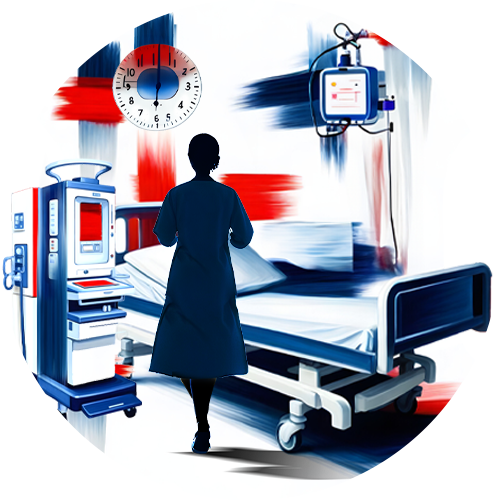On Call — Chapter 17: The Men in Blue
| July 30, 2024I’m wondering if this is going to be my second time calling 911 from the ER

I
like the color blue. The sky is blue. Yitzy’s eyes are blue.
And so are police uniforms.
They’re a relatively common sight in the ER. You won’t hear much of the “Defund the Police” nonsense here. The men in blue are the ones who keep us safe when our work becomes dangerous. They bring in the people from the streets who are drunk, violent, and ill. They accompany the ambulance personnel when they have a tough or threatening patient. And sometimes they bring in criminals — either from jail or before going to jail — to be treated for anxiety or whatnot. Other times, we diagnose these “patients” as malingerers who need to get back behind bars.
It’s a relationship of mutual respect, and I’ve come to recognize many of Chicago’s finest over the past two and a half years.
I’ve only had to call them once before, but I think tonight’s case might end up as the second.
If I strain, I can just remember the first time this happened. I’d been sitting with a sweet, clueless young couple — the most dangerous parents, in my opinion — who’d brought in an eight-month-old baby with a high fever and extreme fussiness. The baby barely took a breath between whimpering and bawling, so most of our conversation was conducted at a decibel more fit for dogs than humans, but we managed. The baby, who was still nursing exclusively (no formula), had a red, tender lump on his back, and he hadn’t eaten since the night before.
Pushing the skin, I could feel the pocket of pus inside the abscess, and I wondered if we could be dealing with a case of sepsis. Inconsolable crying can actually be an early symptom of this serious condition. After the nurse hooked the baby up to an IV line, I ordered some bloodwork and a chest X-ray to check for any infection.
The X-ray results looked ordinary until I peered more closely. What were those things on his ribs? It was so unusual that I gazed at those X-rays for a long time to make sure I was really seeing it — strange swellings on the rib bones. A classic case of rickets, or vitamin D deficiency, which is really rare these days. When I shared my find with the parents, and that I wanted to order a vitamin D level, they didn’t seem to get it.
“Look, doctor, just fix the problem on Nicky’s back, and we can go,” the father said. “We don’t need to do lots of other tests, too.”
“We need to go. We can’t spend all night here,” Nicky’s mom chimed in, smiling cajolingly.
“Let me drain this abscess, and then we can talk about it,” I said in what I hoped was a neutral tone. The poor baby, worn out with crying, was limp as I carefully incised the lump, broke up the pockets of matter, drained the wound, and gently smoothed antibiotics and a fresh gauze over the incision.
“I think he’s going to be all right,” I said. “But I still suspect further internal infection. Nicky needs antibiotics and some further bloodwork done.”
Mom and Dad looked at each other, and I could see my announcement wasn’t eliciting much joy.
“Why don’t you discuss it?” I said diplomatically and stepped down the hallway.
They chose to ignore my advice.
As a mother, it’s hard for me to understand their apathetic reaction. When Yitzy is sick, I would do anything for him. But as a resident with some experience, I’ve come to the cynical realization that people don’t always trust me. The baby looked fine, so the parents left. When the immediate issue is gone, so is my credibility — for some of my patients.
We can’t force an adult to be treated, but a helpless child, who can’t advocate for himself? I called the cops, and Nicky was brought back to the hospital.
Watching the two impatient parents in front of me now, I’m wondering if this is going to be my second time calling 911 from the ER.
Amanda, a skinny ten-year-old, is still wheezing slightly, and that’s not a good sign. Only a few hours ago, her parents zoomed up to the ER and rushed her inside, her breath hissing painfully through the room with each gasp.
“She has a history of asthma,” her mother told me tearfully. “But she hasn’t had an attack like this in years!”
After a quick exam, where I was treated to an incredibly disturbing array of sounds from Amanda’s lungs, the nurse started an IV with magnesium to open her airway, steroids to lower the inflammation, and a dose of epinephrine. We strapped on a nebulizer and started her on albuterol, which dilates the bronchi, the pathways that lead oxygen into the lungs.
“She’s going to need to be on the nebulizer for at least an hour,” I told her parents. They nodded absently, their gazes glued to the struggling girl.
“It’ll be okay, Amanda,” I soothed. “You’ll be able to breathe more easily very soon.”
When I enter the room an hour later, Dad is hunched uncomfortably over the hard chair, his eyes drooping. Mom is busy checking her phone. Amanda looks… better. Somewhat. My heart sinks. Usually, one dose of albuterol is enough, but it looks like we’re going to have to go for a second round.
“Amanda’s breathing has definitely improved,” I say brightly after listening to her lungs. “But not enough. We’ll do another hour of medication.”
“Another hour?” Mom says, trying to hide her dismay.
“I’m sorry, but her lungs still sound tight and congested.” I hope she can feel my sympathy. “Can I help? We do have a vending machine close by, and I can have a nurse bring you some pillows if you want to nap.”
“We’re good,” Dad mumbles.
He’s not so good an hour later when I insist on a third nebulizer treatment. Amanda’s lungs are still sounding off, but Dad only sees that she’s not gasping for air. I wonder if he thinks I want to keep him around to enhance the decor.
And he’s definitely not good when I listen to her lungs after the third treatment and share the exciting news that she needs to be admitted to the children’s ward upstairs.
“Her lungs are not responding properly to the albuterol. She needs more care,” I tell the parents firmly.
“She looks fine to me,” Dad answers.
“I know she does. But she isn’t well enough to leave.”
I leave to request the transfer and return to find them gone. Just like Nicky’s parents. It’s time to make the call.
“They didn’t even make it to their car,” Officer Mackie tells me, escorting the livid pair and a frightened Amanda back into the ER.
“Isn’t this a free country?” Dad chokes out, so furious he can barely speak coherently. “Amanda is fine! Who do you think you are?”
I don’t flinch.
“I’m a doctor but I’m also a mother,” I tell him evenly. “I know how much you care about your daughter. I also care about her. I want to do what’s best for Amanda.”
Dad’s eyes are blazing, but I don’t back down. Amanda will stay.
The ER is not a place any patient wants to be, especially when the wait is interminable. Scared, vulnerable, impatient, tired people don’t always make the right decisions. As a mother, I know how much parents love their children, but even parents make mistakes. As a doctor, I have to care enough to help parents navigate their choices. I can use sympathy, kindness, and logic — but if all else fails, I am going to make sure that every child I treat is as safe as my own son.
Even if I have to use the men in blue.
The characters in this series are composites; all the stories are true.
(Originally featured in Family First, Issue 904)
Oops! We could not locate your form.


